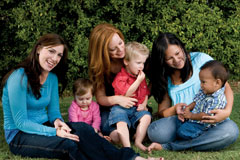 The transition to motherhood can be a shocker for many of us. Woman may suddenly feel isolated, wishing they had the support of sisters. Unlike many cultures in the world, as Americans we rarely grow up in multigenerational group settings, and many of us reach motherhood without a frame of reference for children’s growth and behavior. It can be incredibly soothing to simply learn that we are not alone with our worries and quandaries, and a moms’ group can create that solace.
The transition to motherhood can be a shocker for many of us. Woman may suddenly feel isolated, wishing they had the support of sisters. Unlike many cultures in the world, as Americans we rarely grow up in multigenerational group settings, and many of us reach motherhood without a frame of reference for children’s growth and behavior. It can be incredibly soothing to simply learn that we are not alone with our worries and quandaries, and a moms’ group can create that solace.
“The real value for me in my first moms’ group was realizing that my experience was common,” explains North Seattle’s Nikki Wohlf. “I realized that some of my daughter’s perplexing behaviors were normal, and I didn’t feel isolated in my experience as a mother.”
If nothing else, a moms’ group can simply help you meet new people. Alison Kruse, a Covington mom of four, found joining Maple Valley Moms Club to be a great way to build community. The group provided many social and support opportunities, including play groups, parent education and even Bunco game nights. “When we went to the local grocery store, we would see familiar faces, and it made the town have that small-town feel,” she recalls.
“Everyone says it takes a village to raise a child,” says Queen Anne mom Jenni Pertuset, a local leader for the Seattle chapter of Attachment Parenting International (API). “But few of us live with extended family or near neighbors we know well. Through parenting groups, we can find the folks who support our families in raising emotionally healthy kids.” In the API group, Pertuset has found friendships that have supported her with everything from advice about frustrating behaviors in her child to child care when she was sick.
If you are thinking, “This sounds great! Sign me up!” you’re not alone. Still, you may be wondering how to find that group of moms to share your parenting journey. Never fear. There are a variety of ways to run a moms’ group and a host of places to find the connections you crave. But you will have to invest some energy in creating it and holding it together.
Shared values
The Puget Sound region is rife with organizations that parents can mine to create their own personal groups. If you have a parenting philosophy you intend to follow, look for groups that share it. If you have a faith community, maybe you can post an ad on that community’s bulletin board. If you love music, consider a parent/child music class. If having a neighborhood group is most important to you, talk to moms at the local playground or talk with your neighbors to try to meet other mothers. When you find a group with the shared values that are important to you, you will be better able to make friendships that can be supportive in the context of a moms’ group.
Wohlf recommends making your own values and priorities clear when forming the group, even if that may limit those who will consider joining. Her first moms’ group petered out by the time her daughter was 2. She formed a second group, with an eye toward parenting values and priorities. “In my first group, I didn’t share enough of the group’s values and so I didn’t feel like I could discuss some issues that were important to me. It was a tremendous help for me to find people who shared more of my parenting values.”
But don’t expect to find a group that agrees on everything. For eight years, Ballard mom Joanna Bargeron has been part of a moms’ group that formed on a base of shared parenting values. Yet, she reflects, “Originally we were all attracted to the concept of attachment parenting, but we did it in very different ways. It was challenging to find ways to support each other despite our different interpretations of parenting. But it’s sort of beautiful that things are ultimately still completely random.”
There can be value in that diversity. “It helps to understand that there is a wide range of acceptable practices besides those you know from your own family,” says Bargeron. “In my group, I still get very validated by the range of choices that are OK. I feel as a parent that I don’t judge myself quite as strongly, and I feel more confident in the decisions that I make knowing that there is this range of decisions that people I trust have made.”
Support at every age and stage
Whether you are the mother of a newborn or a teenager, there is benefit in getting together with other mothers for friendship and support. Sara Cole, from Columbia City, started hosting weekly potlucks as a way of connecting with other mothers a couple of years ago. “I wanted more connection for myself and for my kids, and devised the idea of having people come over to help me watch kids and chat while preparing a meal. It simplified the task of creating a meal and supplied social support at the same time.”
Rather than choosing families with children just her children’s age, Cole invited families with children of all ages. “I see a huge value in my children playing with children who are two to three years older than they are. Those kids help them grow in social skills and what they are talking about and learning about.
“Spending time with younger children helps us bring up the stories of who [the older kids] were at that age and how they have grown. They also get small opportunities to care for or help out a smaller person, and that helps gives them a sense of their own personal responsibility in the world in a really sweet way. They become bigger than themselves with smaller people around. Their vocabulary and their emotional regulation rises. It gives them an opportunity to practice the best they can be.”
Find the courage
Jennifer Enich, a La Leche League leader in Ballard, says that she encourages people at meetings to connect with one another in the hopes that they will form their own friendships and groups outside of official meetings. But she understands it can be hard to find the courage to take the step of actually creating a group.
If you worry that your house isn’t a good place for a play group, or fret about the effort of making it presentable for guests, look for other solutions. You can be kind to yourself and lower the standards. “I sometimes feel shy about inviting people into my own house,” Enich muses. “But I remind myself that everyone has kids, and most people want connection more than they want a model setting.” As long as the setting for a group is safe for the kids, people are more likely to be grateful for the place to gather than notice imperfections.
If you just can’t envision opening your home in that way, think about holding regular meetings at a coffee shop, library, community center or other public place. There is no harm in keeping the location flexible if that works for the group. Some mothers meet for a group walk in the summer and move into warm and dry locales for the rainy season. Others change the location as the kids grow. A stroller ride may be fun for a while, but eventually the kids will all want to climb out and run at the playground. Your group can grow and change along with your kids.
Make a plan
Wohlf’s group began by using parenting articles as the basis for a weekly discussion. This helped to both break the ice and inspire people to learn more about parenting. Even so, “The first year wasn’t so great,” admits Wohlf. Personalities were not always a good fit. It took time for the parents and kids to get to know one another. They all had to figure out how they would deal with discipline and other uncomfortable situations as a group. Sometimes they could hardly have a discussion because of the challenges involved with managing a room full of toddlers.
Because of these challenges, they decided to hold a moms-only brunch once a month. “It allowed us to both have uninterrupted conversation and the freedom to discuss things we might not want to in front of our kids,” says Wohlf. “It really helped hold us together.”
Cole also suggests that a group may not get off the ground if too much time is spent building consensus. With so many busy schedules, she was finding a hard time picking a regular meeting time that worked for everyone. “I finally just had to pick a day and tell people that was it. They could join us or not.” In the end, she found a group that worked for her family and continues to meet weekly to share a meal and company.
Start small
Back when Cole started her weekly potlucks, she invited eight families and found that it was probably too many. At the same time she was focusing with great intention on creating her weekly potluck with so many families, she also gathered a small group of homeschooling families to work through an art curriculum together. That group has evolved into a thriving source of regular support for her family, and it now meets weekly and covers art and science projects for the kids.
Being a woman who thinks big, Cole is surprised by the fact that this group evolved from such a small part of her life. “That was a revelation, that it can start as something small and grow as we need it to,” she reflects.
Stick with it
It can be a lot of work to create a group and hold it together. “Sticking it out, despite the challenges, is really important,” says Wohlf. “There were days when we really connected on something, and that made it all worthwhile.”
Regardless of how the group is formed, those that are able to stay together reap profound benefits. Bargeron notes, “There is an affinity that develops because we were put together. I don’t know if we would have become friends had we met in a more generic way. But we are truly friends now. We lived together through a very powerful experience of growing our first children.”
As a homeschooling mother of three and a freelance writer, Tera Schreiber appreciates the social support of parenting groups more than she could have imagined.











